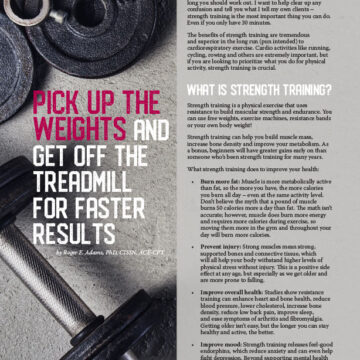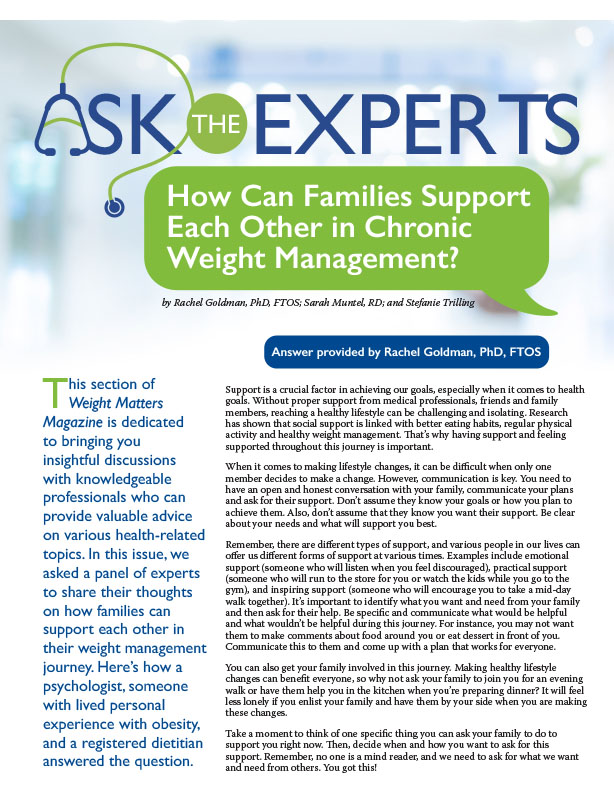Ask the Experts: How do Cultural Factors Impact Obesity?


by Emily Dhurhander, PhD; Nikki Massie, MA; and Sylvia Bollie, MD
Fall 2023
This section of Weight Matters Magazine is dedicated to bringing you insightful discussions with knowledgeable professionals who can provide valuable advice on various health-related topics. In this issue, we asked a panel of experts to shed light on how cultural factors impact obesity. Here’s how a health psychologist, physician, and someone with a lived personal experience with obesity answered the question.
Answer provided by Emily Dhurhander, PhD
Culture shapes how we think about health, food, exercise and medicine. It’s extremely valuable to examine the cultural lens that shapes how we see our weight and health. These insights can reveal strengths we can build on to improve our well-being. They can also reveal weaknesses in our cultural norms that may be holding us back.
Cultural Strengths and Barriers
In my practice, I once worked with an Asian Indian male to help him with his weight-loss goals. When talking about physical activity, I asked if he starts breathing hard when he exercises. He responded, “Of course not! My wife won’t let me. It’s too dangerous to get the heart pumping so fast!” This perspective wasn’t unfamiliar to me, as other Asian Indian patients of mind held similar views. Such instances highlight how cultural perceptions shape our health and habits.
Other cultural beliefs can be significant strengths during a weight management journey. For example, losing weight for health reasons may be easier without facing cultural expectations around body shape. Additionally, cultures that encourage home-cooked meals can make weight management a lot easier, as they offer greater control over ingredients and portion sizes.
Which cultural norms or beliefs can make weight management easier? Which norms or beliefs are in the way? Friends from other cultures might offer valuable perspectives on common issues. So, ask around and give it some thought. By appreciating the strengths that cultures bring to the table and addressing the barriers they pose, we can find a better way to be healthy and happy.
Answer provided by Nikki Massie, MA
I am proud to be a black woman (and I prefer the term “black” to “African-American”). I am a descendant of both enslaved people and 19th-century immigrants, particularly from the city of Baltimore. Each of these factors contributes to my cultural identity, and each has influenced my experience with obesity. Let’s start at the top.
As a black woman, I think the most noticeable way my cultural experience has influenced my journey with obesity is how I perceive my body. My mother was very intentional about surrounding me with imagery of black people and raising me within an extended family of beautiful black women. None of them were what you would call “small.” So, growing up, I never viewed larger bodies as something negative. When I see people of size, I see my mother, my grandmother, my aunties — None of whom ever thought less of themselves because of their size. I am very fortunate that way.
Being descended from both enslaved individuals and 19th-century immigrants creates a strong connection to my history, especially through food. In almost any culture, food is more than food. It is history. It is tradition. It is familial ties and rites of passage, as recipes are passed down from generation to generation. When I first had my gastric bypass surgery in 2008, I had to refrain from eating a lot of foods traditional to my family gatherings, which hurt some feelings. To my family members, it felt like I was rejecting our history and culture, not just specific dishes. Eventually, they respected my health journey, but it took many conversations to understand that I still love our food and the heritage it carries while still recognizing I needed to do something different for my health.
Furthermore, being a Marylander, particularly a Baltimorean, means growing up in an urban center. I love my city — but parts of it are altogether unwalkable. In some of the places I’ve lived, it’s not safe to go on walks, and going for a jog is asking to be catcalled. I hate pointing that out because I don’t want to further stereotypes about Baltimore, but that was a reality for me. Thankfully, the tide is turning, and more Baltimoreans are demanding better outdoor spaces. More people – especially more black people in my area – openly run, jog, bike and do other outdoor activities. It’s becoming commonplace, and that makes me proud.
At the end of the day, there are lots of parts to who I am, each impacting my health journey in different ways, yet all contributing to my growth. For others starting a similar journey, I encourage you to stay true to yourself, embrace the adventure where you can, and not be afraid to start new traditions for yourself, your family and your community.
Answer provided by Sylvia Bollie, MD
Understanding culture in obesity care is vital. Different groups of people have their own ways of thinking about the same information. For example, one culture might celebrate a person’s weight, and one culture might criticize it. Let’s be clear. Everyone has a certain culture they relate to, not just diverse populations or people with obesity. But, in the past, health advice was often biased and focused on specific groups. Therefore, we need to recognize all types of bias and give effective care that respects different cultures for people with obesity.
As healthcare professionals, we get “clues” about culture from things like age, ethnicity, race, social history, food preferences, body size preferences and more. But just looking at these hints isn’t enough to create culturally sensitive care. We must ask patients what they prefer and involve them in important decisions about their health. Two important areas where culture commonly impacts obesity care are food preferences and how people feel about body size.
Food is a big part of cultural identity. It’s important to make food plans that include healthy foods people are used to from their culture. For example, recommending that someone should follow the Mediterranean Diet might not mean much to them. But if we look at foods within a suggested plan, we can help them find foods that fit their culture.
Feelings about body size are also influenced by culture. Curves can be celebrated in one culture while criticized in another. Healthcare professionals must be careful not to let their own opinions influence how we guide patients with obesity. When we look at weight, it’s important to consider how the patient feels and use information that fits their culture. I call this the “Happy, Healthy Weight” idea, combining how someone wants to weigh (their “happy weight”) with what’s healthy. “Happy weight” is about what a person prefers, but it can be influenced by a lot of things, like cultural norms. “Healthy weight” goes beyond just a person’s body mass index (BMI), which has multiple biases. Instead, “Healthy Weight” looks at a person’s waist circumference, body composition, health conditions, goals, and special BMI charts that consider age, ethnicity, obesity-related conditions and race.
In short, thinking about culture in obesity care helps doctors and healthcare professionals make sure we’re helping people reach their personal goals instead of pushing our own ideas onto them.
About the Authors:
Emily Dhurandhar, PhD, is the Chief Scientific Officer at Obthera, Inc. During the development of Obthera’s flagship product, she was involved in creating dietary treatments for Asian Indian, Mexican American and American adults. She shares her insights from that experience and how culture shapes the weight management journey.
Nikki Massie, MA, has been a member of the OAC since 2013 and serves on its national board as well as co-chairing the membership committee. Her favorite way to take OAC Action is to tell people about the Obesity Care Providers website. She lives and works in Baltimore, Maryland.
Sylvia Gonsahn-Bollie, MD, DABOM, FOMA, is a leading obesity expert, dual-board certified integrative obesity medicine physician, bestselling author and founder of Embrace You Weight & Wellness, which champions innovative, integrative, individualized obesity solutions for all people. Dr. Sylvia is passionate about addressing the disparities in obesity, especially among women and within the Black community. She maintains a presence on all social media platforms under the handle @embraceyoumd. You can contact Dr. Sylvia at www.drsylviagbollie.com or Embrace You Weight & Wellness at www.embraceyouweightloss.com.
by Rachel Goldman, PhD, FTOS; Sarah Muntel, RD; and Stefanie Trilling Winter 2024 This section of Weight…
Read Articleby Nina Crowley, PhD, RD (with Inspiration from Shawn Cochran) Winter 2024 Dating, no matter your age,…
Read Articleby Leslie M. Golden, MD, MPH, ABOM Diplomate Winter 2024 The journey to overcoming obesity is a…
Read Article








